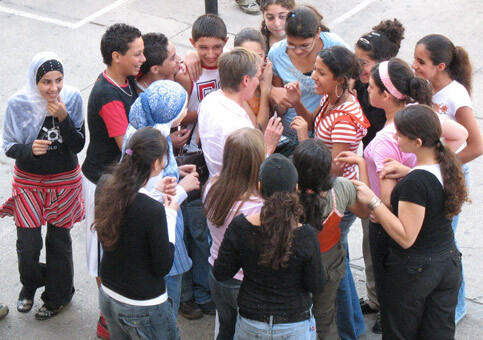IRIN 16 October 2006

Students gather around a reporter in Naameh High School in the southern suburbs of Beirut on the first day of school. (Marie Claire Feghali/IRIN)
BEIRUT/ANSARIYEH - Thousands of children returned to school across Lebanon on Monday after a summer of war, destruction and displacement.
“I am happy to be back in school,” said 11-year-old Fatima Aasi, who goes to school in her home town of Ansariyeh, 30km south of Beirut. “During the war we were very scared, but now I feel like things will be normal again.”
After the United Nations-brokered ceasefire that ended the 34-day conflict between Israel and Hezbollah on 14 August, the Ministry of Education, in partnership with the UN children’s agency (UNICEF), initiated a national back-to-school campaign with a commitment to ensuring that children in public schools could begin classes on October 16 - three weeks later than the usual start date.
“We don’t know how many schools have, realistically speaking, been able to open their gates today,” said Lara Ali Ahmed, education officer for the United Nations children’s agency (UNICEF). “Most directors across the south were keen to meet the set date, but it remains uncertain how many have been able to do so.”
Ali Ahmed estimated that approximately 85 percent of children in primary education were able to return to school, but that it would be impossible to determine how widespread initial school attendance was until next month.
At the more than 50 schools in Lebanon that have been completely destroyed, children are attending school in neighbouring villages, using double shifts when necessary. Other schools were not directly damaged by the conflict, but housed many displaced who fled their homes. These schools required cleaning and minor repairs.
UNICEF has worked closely with the Ministry of Education to find solutions to ensure access to classrooms where schools have suffered varying degrees of damage.
UNICEF is distributing school bags and stationery to children across southern Lebanon and the Beqaa valley - the two areas outside the southern suburbs of Beirut that suffered the greatest destruction in the conflict.
“For children, their ability to return to school guarantees a return of a certain degree of normalcy,” Roberto Laurenti, UNICEF representative in Beirut, said.
Various obstacles
However, there remain various obstacles to a complete resumption of normal life, not least the heavy damage incurred to infrastructure in southern Lebanon.
“During the war, I used to pray that the bombs would not strike our house. Now, there is still a lot of destruction, so I still don’t feel like everything is normal yet,” said 10-year-old Hawra Hekmet Rmeh.
Ansariyeh government school suffered much damage from the bombing of a nearby house. “There is still shattered glass in the playground,” said Ali Ahmed. “Part of the complete resumption of normalcy requires that the school environment also be safe.”
Many displaced children in southern Lebanon, particularly along the southern border with Israel, have not been able to return to schools in their own towns and villages because of damage to school buildings.
“All the children have suffered emotionally from this war,” said teacher Fatme Dib. “There is no doubt that those who are far away from their homes, living in rented flats or with relatives while their family home is rebuilt, will suffer the scars for a longer time.”
However, the education ministry, UNICEF, teachers, parents and students alike appeared optimistic that this would be a good school year in spite of the difficulties.
Damaged and destroyed schools have for the most part not been repaired, but the United Arab Emirates government has pledged to foot the bill for the rehabilitation of all schools in southern Lebanon, both private and public.
According to Ahmed Ali, coordination continues to be underway for the reconstruction to take place.
Beirut book shortage
In Beirut, 25,000 students endured rain and heavy traffic to go back to school.
“All 19 high schools and 56 elementary and primary schools of the capital opened normally today,” said Mehyeddine Kechly, head of Beirut public schools in the Lebanese Ministry of Education.
“Of course, war imposed some changes. Some of the schools are overloaded with students, others not, but we are prepared to provide them with extra spaces, thanks to NGOs and the [governmental] Committee of Education and Research,” he added.
In the capital, the main problem was a lack of books. The Ministry of Education said it expected the book problem to be solved in 10 days, as donations promised by the UAE were still on their way.
However, not all students were so pleased to be back after such a miserable summer. “Excited? Of course not!” said Sarah, 12, as she prepared to go to a class in Dekwaneh in the eastern suburbs of Beirut. Until recently, her school housed some 250 displaced people from southern Lebanon and the southern suburbs of the capital.
“We didn’t have much of a summer,” she told IRIN, “we just watched TV the whole time and stayed home.”
This mood is magnified in southern Lebanon, where many children feel that the two-month-old ceasefire will not hold up for long.
“I feel like there will be another war soon,” said Fatima Abbas, 10, who attends Ansariyeh government school. “I feel afraid when I hear planes in the sky. But I also feel happy - if there is another war, at least I will have seen my friends beforehand at school.”
This item comes to you via IRIN, a UN humanitarian news and information service, but may not necessarily reflect the views of the United Nations or its agencies. All IRIN material may be reposted or reprinted free-of-charge; refer to the copyright page for conditions of use. IRIN is a project of the UN Office for the Coordination of Humanitarian Affairs.
Related Links